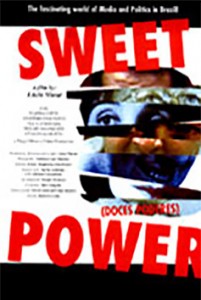
Bia, a journalist from Rio de Janeiro, arrives at Brasilia, the Brazilian capital, to assume, during electoral campaign, the branch of the greatest TV of the country, the TNA.. Half the professionals in the TV branch had gone away to work for very high wages in different campaigns all over the country. This professionals will appear during the film in interviews made in edit rooms . They justify their work using the most various speeches - since the economical crisis to the lack of political perspective in this end of the century. Through this interviews, the film shows the conflicts lived by this characters.
The center of the history is the relation between the TNA and the campaign in Brasilia. The ex-director of TNA in Brasilia had gone to head the campaign of a young candidate to Governor of the state, supported by conservative politicians. This candidate uses a speech that appeals to the populism, but with modern words. The opposition support a black candidate and in the coordination of this campaign is a very respected deputy - from the left, Chico Silva, an old love of Bia. In the redaction, she meets also a young and efficient journalist, Alex, worried above all with his career in the TV. They form then a love triangle, and personal problems will moisture with ethical and political questions. The power of the media and the roll of the journalist in today's world will put them in check.
All the characters will face ambiguous situations, in ethical point of view. It doesn't exist more black and white reality. Bia see her work manipulated by the direction of the TV and the campaign in Brasilia grows in a crescendo of appeals and personal questions. The reaction to all this manipulations and circumstances that involved illegal procedures is the history of this film, that little by little wins the tone of a thriller.
Todos os personagens vão se deparar, durante o filme, com situações ambíguas e eticamente discutíveis. Não existe mais preto e branco e todos se vêem diante dessa estranha realidade cinza. O deputado, para poder emplacar seu partido, faz frente em outros estados com candidatos à direita. A jornalista vê seu trabalho manipulado pela direção da emissora. E a própria campanha em Brasília vai num crescendo de apelações e utilizações pessoais. A reação a estas manipulações e a todas estas contingências, entremeada por reencontros e desencontros afetivos, é a história deste filme.
Director´s note
We live in a world where cynical reason no longer opposes utopic reason. Sweet Power places this issue before the naked eye, from various points of view: the media, the political power and the individual perspective of communication professionals. Its importance relies on demonstrating how this issue is manifested concretely in Brazil, a country where a recent democracy is juxtaposed with a perverse form of capitalism. Unmasking the way in which political power establishes itself , showing all the forces at stake during an election, is extremely important in order to grasp the country we live in.
The lofty budgets afforded these electoral campaigns have made routine the participation of advertising professionals, editors, reporters, and film makers to join this market, regardless of any criteria, except for the financial one, in choosing the candidates for whom they'd work. Pressed by the struggle for survival, lost among dreams that have died, ethics seems to have become something of the past. The schizophrenia and savagery of those relations are uncovered here. This is an opportunity for the spectator to be moved, to think Brazilian reality with no manichaeisms. Rotten power or sweet power?
The film asks: how to survive all these contradictions , if there is no longer a myth at the end of the tunel? Sweet Power is inserted in a line of films which seek to reestablish a relation with the Brazilian viewers, respecting them as people who can and must be critical. And, in spite of unmasking power relations that exist in our country, it deals with matters that affect the wole world: the monetarization of human relations, the new role of the media and the crises of ethics.
Press comments
"Savvy send-up of media manipulation is both amusing and chilling. (B. Ruby Rich - The Village Voice)
"Murat's direction is visually inventive.... Orth gives a strong performances as Bia, vividly conveying The sharp intelligence and self-deprecating humor of a professional who is worldly wise but not yet cynical." (Joe Leydon - Variety)
"Sweet Power is full of humor, romance, intrigue, and real conflict." (Ramiro Puerta - Sundance Film Festival)
"Sweet Power has the no-nonsense courage of its not inconsiderable convictions, marking it as film of unexpected dramatic rewards." (Eddie Cockrell - Filmfest DC)
Official selection
Sundance Film Festival
Film Forum Berlim
New England Latin American Film Festival - USA - 1997
Washington International Film Festival - USA - 1997
Philadelphia World Cinema - USA - 1997
Mar del Plata Festival - Argentina - 1997
London Latin American Film Festival - UK - 1997
Chicago Latino Film Festival - USA -1998
Cruzando Fronteras - Washington - USA - 1998
Los Angeles Latino Film Festival - USA - 1998
Festival de Serra da Estrela - Portugal - 1998
San Diego Latino Film Festival - USA - 1999

Cast
Marisa Orth, as Bia
Antônio Fagundes as Chico Silva
Tuca Andrada as Alex
Sérgio Mamberti as Bob
Otávio Augusto as Léo Miranda
Credits
Production, direction and script: Lucia Murat
Photograhy: Antônio Luiz Mendes
Edition: César Migliorin and Vera Freire
Sound track: Sacha Amback, with Adriana Calcanhoto
Art direction: Sergio Menezes
Costumes: Inês Salgado
Direct sound: Heron Alencar and Chico Bororo
Mixed: Roberto Leite
